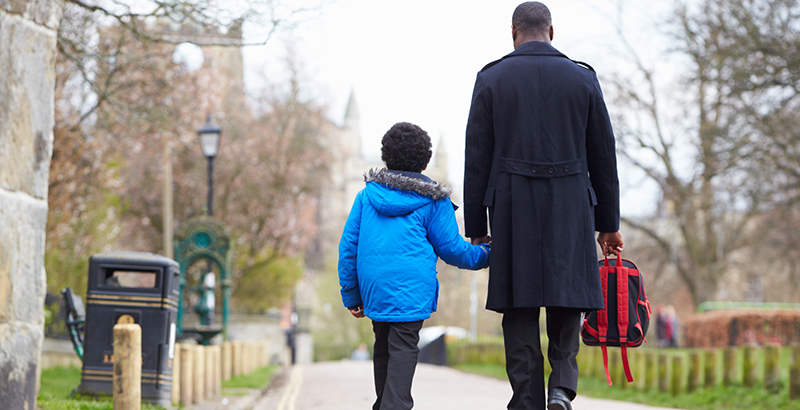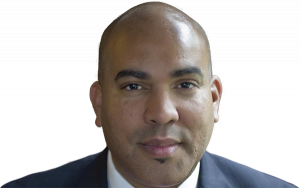A Parent’s Perspective: Excuse Me, What Did You Call My Child? When the ‘Belief Gap’ Cuts a Little Too Close to Home

This essay originally appeared at CitizenStewart.Rocks.
Excuse me, what did you call my child?
The week before last, I had the opportunity to speak with hundreds of Louisiana schoolteachers who attended a session I led on the belief gap in education.
For readers who haven’t heard me talk endlessly about that concept, the belief gap is the distance between what a child is actually capable of achieving and what the adults in her life think she is capable of achieving. (Related — “Falling Into the Belief Gap: What It Feels Like to Realize Your Child’s Teachers Have Sized Him Up and Dumbed Down Their Estimations”)
I approached the topic by relaying a story from my life that I didn’t know had such importance to me until the words were coming out of my mouth.
A few years ago, one of my kids’ teachers asked me an odd question as I dropped him off at his class.
“He didn’t attend preschool, did he?” she asked.
I said no.
Like my other kids, he stayed home with my wife until beginning school. We’ve made sacrifices to make it possible to bypass preschool for our kids, and we’re happy we did it. We feel blessed that it was even an option. The upside is that it has given us so much insight into the personalities, talents, and needs of our kids.
I had no idea that would be considered anything other than good.
“I can always tell the kids that don’t go to preschool,” she said. “He’s lethargic a lot of mornings.”
Lethargic?
Of everything that happened in that school year, what I remember most is that word. She was talking about my spit-your-water-out funny kid who constantly demonstrates intellectual curiosity, creativity, and a grasp of details in storytelling so acute it’s our family joke that he would be the best witness for investigators to talk to at a crime scene.
Lethargic.
Help me unpack that exchange.
I am a black man in a hallway with a white woman who has called my son a word the dictionary says is synonymous with sluggish, inert, inactive, underactive, slow, torpid, and lifeless.
What was I supposed to do with that?
What were the appropriate words that should have come out of my mouth (words that would have allowed me to remain Christian and not incarcerated)?
As of now, I have no answer.
But what I told the teachers in Louisiana: As I think about that brief encounter, I realize that Ms. Lethargy and me were coming to that point in time from very different points of origin. Our experiences, cultures, family norms, and education were doing silent battle in the moment.
That speaks to the broken dialogue between (black) parent and (white) teacher, home and school. We cannot be the partners we need to be in filling the belief gap if we speak past each other, ignoring the pasts we bring with us to conversations.
My part of that equation is owning my luggage. What that teacher could not see is the invisible backpack I wore as I walked my son to his class. It’s a backpack full of experiential artifacts that, in truth, should make it improbable that I would even want to set foot in that school building.
My dialogue-blocking artifacts include a series of unfortunate events in my early school career. The educators who openly doubted my potential and intelligence and nominated me for lower educational tracks; the words from a teacher who told my class that “you are the most ignorant bunch of negroes I’ve ever seen in my life”; the teacher who sent me to the principal’s office so often that it felt like it was the new location for that class (my crime was asking too many questions); the smothering shame I felt for falling three grade levels behind beginning in sixth grade; and the day I stood up and walked out of high school and never returned (no one noticed).
In my backpack, there is a stack of disappointments and failures. Some are self-imposed, and others are a result of bombing spectacularly in school.
When my first child was born, it was as if someone unzipped that backpack and dumped out the contents on the table. Fatherhood made me sort through those items and made me confront the painful truths I’d prefer to hide and the personal inadequacies I tucked far out of sight.
My biggest fear was that school failure – and the subsequent economic marginalization – was somehow hereditary. This baby that I loved so dearly would replicate my poor start in life and be assigned to the same low-level, monotonous, soul-stealing work I was doing.
In his early grades I zipped the backpack up again, and then resolved to do what I could to change his future. I did this even as the tapes playing in my head were loud and negative and unrelenting. “This isn’t going to work,” I thought. “Something is going to go wrong,” I believed.
Regardless, I’d learn what I could, fight anything that seemed a threat, and sacrifice whatever necessary to set him up to beat the system.
Being honest about those negative messages on my internal tapes is one way of admitting that the belief gap is a shared gap. Sometimes parents and community members hold so much internalized racism and oppression that we think of — and talk about — our kids worse than any outsider.
It’s important for me to acknowledge that because reading what I write and say about education, it would be fair to assume I lay the belief gap solely at the feet of teachers and schools. It’s not true. Yes, we have more than enough research to show teacher expectations are far too low for our kids, but, sometimes our own expectations are just as low.
If writing is about truth, that’s mine. If reading is about understanding, I hope you’ll share yours.
Last point: On firstborn’s first day of school, I took a deep breath, secretly expecting to encounter some unmovable object that would derail our journey.
On the day he graduated from college, I exhaled, thanked my Lord and Savior, and cried privately.
That closed my belief gap, but the backpack remains.
Read more: CitizenStewart.Rocks.
Get stories like these delivered straight to your inbox. Sign up for The 74 Newsletter

;)
